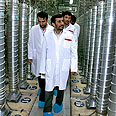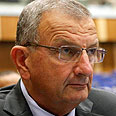

Blaming Israel for assassinating its nuclear scientists, Iran said Tuesday it would not retaliate for the "ugly phenomenon" but would seek more international support against such killings.
Israel in turn accused Tehran of secretly working on nuclear arms, warning that it may be the first nation to develop such weapons while being a member of the Nuclear Nonproliferation Treaty.
Related stories:
- Cheney: Israel to attack Iranian nuclear facilities
- Iran vows to protect nuclear scientists
- Iranian nuclear plant begins operations
The recriminations at and outside of a meeting of the 151-nation International Atomic Energy Agency reflected the bitterness dividing not only the Mideast's most intractable foes but of the camps supporting them.
Iran is under four sets of UN Security Council sanctions for not mothballing a program that can make both nuclear fuel or fissile warhead material. It has rapidly expanded since being discovered in 2002, and concerns have grown with the country's refusal to allow the IAEA to probe growing intelligence-based allegations that it is working on a nuclear warhead and other aspects of a weapons program.
Tehran insists, however, it is only interested in nuclear power, not weapons. It says the intelligence is fabricated by the United States and its allies, arguing it is the target of a campaign by world powers meant to keep it and other developing nations from the benefits – and profits – of peaceful nuclear technology.
Criticizing US ally Israel for not acknowledging it has nuclear weapons, Tehran exploits Muslim hostility and fear against the Jewish state as it seeks to blunt concerns about its own growing nuclear prowess.
Israel has not commented on Iran's accusation that it was behind the killings of at least two nuclear scientists and the wounding of a third since January 2010.
Its campaign against the Islamic Republic focuses on warnings that Tehran is rapidly nearing nuclear weapons state status and demands that the international community act before it is too late to prevent such a development.
'Iran wouldn't retaliate against killings'
Arguing his case Tuesday to reporters at an event featuring family members of the killed victims, Iranian IAEA envoy Ali Asghar Soltanieh said his country would not retaliate against the "ugly phenomenon of assassinating ... nuclear scientists to stop Iran's nuclear progress."
Instead, he said, Tehran will push for greater international condemnation of such practices, adding he is "very sure about the support of almost all member states" of the 151-nation IAEA.
Mansoureh Karami, the widow of assassinated scientist Masoud Ali Mohammadi, blamed the "Zionist regime" for the killings. In an indirect poke at the United States and its allies, she said nations who "falsely claim human rights share these crimes."
The Iranian delegation also showed a film featuring Majid Jamali Fashi – who Iran says is the killer of one of the scientists – asserting that he was recruited by the Jewish state. Israeli nuclear chief Shaul Chorev meanwhile insisted inside the IAEA meeting that the real danger was Tehran.
"Not only is Iran continuing its enrichment related activities in defiance of UN Security Council resolutions, but it is also engaged in activity directly related to the design and testing of nuclear weapons," he said.
"Absent an effective response by the international community, Iran may become the first country to acquire nuclear weapons while being member of the NPT."
- Follow Ynetnews on Facebook
- Receive Ynetnews updates
directly to your desktop















